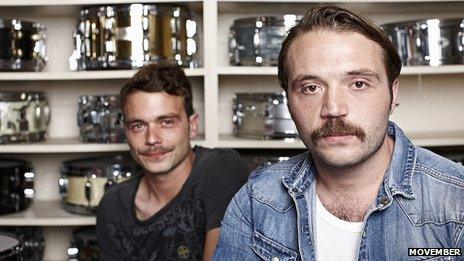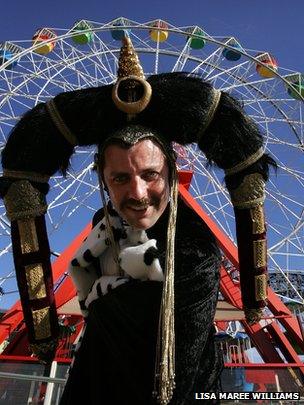What has Movember done for men's health?
- Published

Fathers and sons have made a statement in aid of Movember
Handlebar or pencil? Freestyle or fu Manchu?
These are the stylistic quandaries that men are facing as November approaches and the moustache becomes a symbol of men's health issues for the Movember charity project.
But with so many campaigns vying for our attention, what difference is it really making? And is there a danger of fundraising fatigue?
Ten years ago in a Melbourne pub, two young men were chatting about fashion trends over a beer when they decided the moustache deserved a comeback and persuaded 30 friends to grow a 'Mo' for charity - for ten dollars a go.
That first November in 2003 they raised nothing, but they persevered and ended up raising A$54,000 (£32,000) for the Prostate Cancer Foundation of Australia the following year.
Now operating in 21 countries, Movember - as it became known - generated £27m in the UK last year and more than £92m around the globe.
Since that first pub rendezvous a total of £300m has been raised for research into prostate and testicular cancer.
In that time, hundreds of thousands of men have tried cultivating a moustache and started talking about diseases that they are often too embarrassed to discuss or too quick to ignore.
Blokey banter
Justin Coghlan was one of the original band of Melbourne MoBros and is now head of Movember in Europe. He is still amazed by just how successful it has become and he claims it is all to do with the male urge to bond.

Luke Slattery was one of the original MoBros
"Every guy wants to know what it's like to grow a moustache," he says.
"It's a fun thing to do with your friends and it sparks conversations with complete strangers too. It's all about guys coming together, but for a serious reason."
In a competitive fundraising environment, where virtually every month of the year has been adopted by a cause or a charity, making their idea stand out from the crowd was a major challenge.
Natasha Hill, director of brand and strategic marketing at Cancer Research UK, says Movember has definitely achieved that.
"I really admire Movember - it is so different and so fresh. They nailed the tone of voice when there was nothing else like it.
"They found a way to appeal to men in a way that other campaigns just don't - with banter, and a sort of blokey jokiness."
This is no small feat since men are generally reluctant to go to their GP and have been known to boast about how long it has been since they last saw a doctor.
Independent research found that Movember has had an impact. More men are talking about health issues specific to them, getting general check-ups and becoming more aware of the health risks they face.
Global research
But the real impact is being felt in prostate cancer and testicular cancer research, which has received a massive boost.
Prostate Cancer UK receives £15m from Movember and puts half of that into research and the other half into community support services.
Iain Frame, head of research at the charity, says the funding has made a huge difference.
"There has been less investment in prostate cancer than in breast cancer up until now, partly because it's a more complicated disease. We're currently over-diagnosing it because there isn't a routine screening test.
"Prostate cancer cases have doubled in the past 10 years and we can see the Movember effect in the past four years as the level of investment has started to spike."
Predicting which men are at high risk of an aggressive form of the cancer is now a realistic target.
In testicular cancer research, funding is traditionally harder to secure because it is a less common disease.
Dr Clare Turnbull, who heads up the testicular cancer study at the Institute of Cancer Research, says the key is to identify men at high genetic risk before the cancer develops.
"Before, we could sequence one bit of the gene at a time - now we can run hundreds of thousands of experiments in parallel by sequencing all 20,000 genes simultaneously.
"It's a complete game-changer."
Funding from Movember has made these research projects possible, but there is still work to do.
"We have found a good set of variants but they don't predict enough of the risk at the moment. We are 20% of the way there but it gets harder and harder," Dr Turnbull says.
But as the only place in the world doing these experiments on testicular cancer, there is a good chance her team will get there.
Pink example
In the past 20 years perhaps only the pink ribbon, the international symbol for breast cancer awareness, has had a similar impact on cancer fundraising.
Adopted in 1992, and inspired by the red ribbon for Aids awareness, it showed what could be done with a colourful symbol and and powerful message.
Breast cancer survival rates are now improving thanks to faster diagnosis, improvements in treatment and raised awareness.
Yet, Cancer Research UK, one of the biggest charity brands in the UK, knows that the fight against cancer costs a lot of money.
Without the £460m it raised last year through public fundraising, it would not be able to pay for drug trials, research in hospitals, institutes and universities, experiments on new radiotherapy techniques and national awareness campaigns, to name but a few.
Although a third of that comes from money left in people's wills, CRUK still relies heavily on people taking part in their events, spending in their shops and giving regular donations.
Natasha Hill says there is no danger of complacency and there is a constant search for new fundraising initiatives.
Stand Up To Cancer, a campaign where people get on their feet to raise money, and Dryathlon, staying off alcohol for a month, are just two of their ideas - but there are many more in the pipeline.
The public could be forgiven for suffering from fundraising fatigue - but there appears to be little evidence for it.
In any case, the charities appear to be prepared.
Natasha says: "Demand for consumers' eyeballs is ever increasing so we have to keep refreshing our fundraising ideas.
"We need to ensure that everything we do appeals to an increasingly digitally-savvy audience, making it easy for supporters to be able to give money via mobile and web devices."
The challenge for Movember will be to maintain the month-long moustachioed momentum they have created and continue to give cancer scientists plenty to do.
- Published6 March 2013
- Published17 May 2012
- Published22 May 2012
- Published1 November 2012